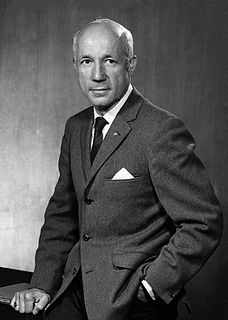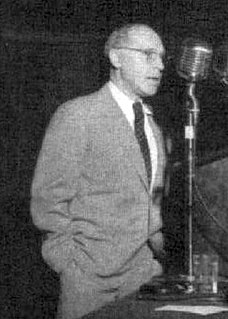A Quote by Melvin Calvin
If I may take the liberty to speak for science at least, today his name and his prizes are without a peer in the world. He not only elevates science but he influences it as well.
Related Quotes
I think men of science as well as other men need to learn from Christ, and I think Christians whose minds are scientific are bound to study science that their view of the glory of God may be as extensive as their being is capable. But I think that the results which each man arrives at in his attempts to harmonize his science with his Christianity ought not to be regarded as having any significance except to the man himself, and to him only for a time, and should not receive the stamp of a society.
Science was blamed for all the horrors of World War I, just as it's blamed today for nuclear weapons and quite rightly. I mean World War I was a horrible war and it was mostly the fault of science, so that was in a way a very bad time for science, but on the other hand we were winning all these Nobel Prizes.
Many people correctly make the point that our only hope is to turn to God. For example, Charles Lindbergh, who said that in his young manhood he thought "science was more important than either man or God," and that "without a highly developed science modern man lacks the power to survive," . . . went to Germany after the war to see what Allied bombing had done to the Germans, who had been leaders in science. There, he says, "I learned that if his civilization is to continue, modern man must direct the material power of his science by the spiritual truths of his God."
How often people speak of art and science as though they were two entirely different things, with no interconnection. That is all wrong. The true artist is quite rational as well as imaginative and knows what he is doing; if he does not, his art suffers. The true scientist is quite imaginative as well as rational, and sometimes leaps to solutions where reason can follow only slowly; if he does not, his science suffers.
Whatever man may stand, whatever he may do, to whatever he may apply his hand - in agriculture, in commerce, and in industry, or his mind, in the world of art, and science - he is, in whatsoever it may be, constantly standing before the face of God. He is employed in the service of his God. He has strictly to obey his God. And above all, he has to aim at the glory of his God.
As science is more and more subject to grave misuse as well as to use for human benefit it has also become the scientist's responsibility to become aware of the social relations and applications of his subject, and to exert his influence in such a direction as will result in the best applications of the findings in his own and related fields. Thus he must help in educating the public, in the broad sense, and this means first educating himself, not only in science but in regard to the great issues confronting mankind today.
In science men have learned consciously to subordinate themselves to a common purpose without losing the individuality of their achievements. Each one knows that his work depends on that of his predecessors and colleagues, and that it can only reach its fruition through the work of his successors. In science men collaborate not because they are forced to by superior authority or because they blindly follow some chosen leader, but because they realize that only in this willing collaboration can each man find his goal.
But science can only be created by those who are thoroughly imbued with the aspiration toward truth and understanding. This source of feeling, however, springs from the sphere of religion. To this there also belongs the faith in the possibility that the regulations valid for the world of existence are rational, that is, comprehensible to reason. I cannot conceive of a genuine scientist without that profound faith. The situation may be expressed by an image: science without religion is lame, religion without science is blind.
Rifkin's assertions bear no relationship to what I have observed and practiced for 25 years ... Either I am blind or he is wrong - and I think I can show, by analyzing his slipshod scholarship and basic misunderstanding of science, that his world is an invention constructed to validate his own private hopes ... Rifkin shows no understanding of the norms and procedures of science: he displays little comprehension of what science is and how scientists work.
From space travel to organ transplants, one of the most important influences shaping the modern world is science. Amazingly, people who lived during the Civil War had more in common with Abraham than with us. If Christians are going to speak to that world and interact with it responsibly, they must interact with science.
And do you know, do you know that mankind can live without the Englishman, it can live without Germany, it can live only too well without the Russian man, it can live without science, without bread, and it only cannot live without beauty, for then there would be nothing at all to do in the world! The whole secret is here, the whole of history is here. Science itself would not stand for a minute without beauty
No doubt science cannot admit of compromises, and can only bring out the complete truth. Hence there must be controversy, and the strife may be, and sometimes must be, sharp. But must it even then be personal? Does it help science to attack the man as well as the statement? On the contrary, has not science the noble privilege of carrying on its controversies without personal quarrels?
I can't get used to the ease with which one covers the world today. It's no longer an effort--Pole--equator--oceans--continents--it's just a question of which way you point the nose of your plane. The pure joy of flight as an art has given way to the pure efficiency of flight as a science.... Science is insulating man from life -- separating his mind from his senses. The worst of it is that it soon anaesthetizes his senses so that he doesn't know what he's missing.



































